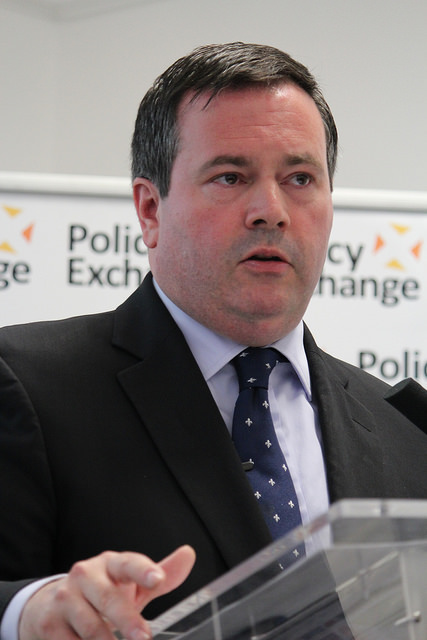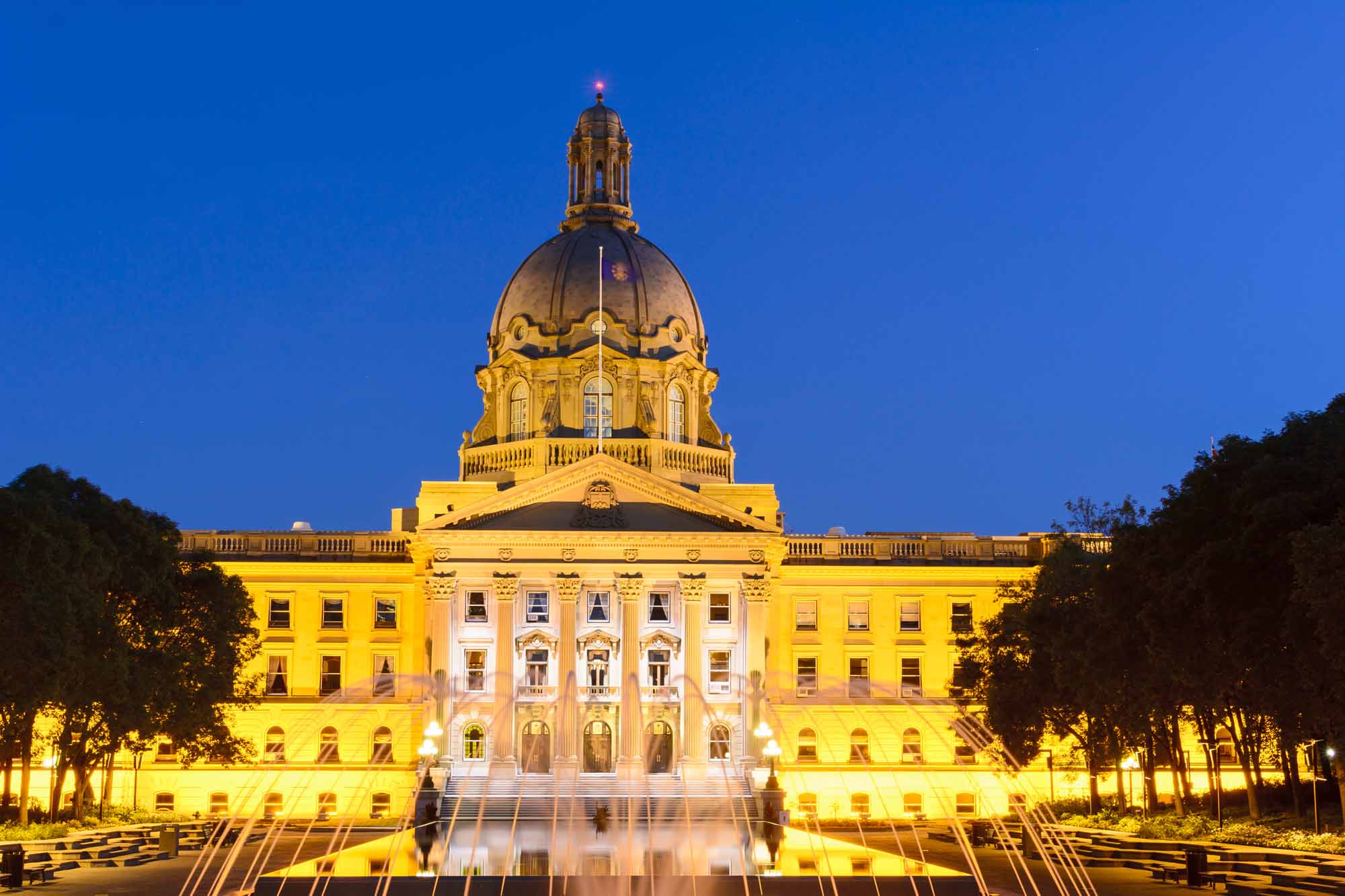Marlaina Danielle Smith, politician, journalist, radio host, lobbyist, leader of the Opposition of Alberta (2012–14), premier of Alberta (2022–present) (born 1 April 1971 in Calgary, AB). Danielle Smith has been the premier of Alberta and the leader of the United Conservative Party (UCP) since October 2022. She had previously led the Wildrose Party but defected to the Progressive Conservatives in 2014. Outside of politics, she has also worked as a journalist, radio host and lobbyist for various pro-business organizations.

Early Life
Danielle Smith was born and raised in Calgary. Her father worked for the Firestone tire company. Her mother worked at a local diner and later at Canada Post. (Both eventually took jobs in the oil sector.) Throughout Smith’s childhood, her family lived in subsidized housing. Smith, the second of five children, often looked after her younger siblings.
Smith’s parents were politically conservative. At one point in Smith’s youth, her father reprimanded one of her middle school teachers for sympathetically discussing communism in class. Smith later said that her libertarian political beliefs “are largely born out of a complete distrust of the socialism from which my great-grandfather fled.” (Smith had claimed that her great-grandfather lived in Ukraine until around the time of the First World War. However, records indicate that her great-grandfather lived in Austria-Hungary and left for Canada in 1913 — well before the Russian Revolution introduced socialism to the region.)
Education and Early Career
In 1988, Danielle Smith enrolled at the University of Calgary, where she majored in English. After graduating in 1993 she moved to Vancouver, where she worked in restaurants and attempted to start a career as a film and TV actor. Two years later, she returned to the University of Calgary. She earned a second BA in economics and — under the mentorship of political science professor Tom Flanagan — gravitated further toward a conservative political outlook.
Upon graduating in 1997, Smith began an internship at the Fraser Institute. She contributed to reports that criticized the media and social movements for spreading “alarmist misinformation” about the environment and climate change. She then became the managing director of the Canadian Property Rights Research Institute. It promoted private property rights and opposed endangered species laws and municipal anti-smoking bylaws. Smith also established links within the Reform Party during this time.

School Board Trustee, Journalism and Lobbying
In 1998, Danielle Smith made her first foray into electoral politics with a successful bid for the Calgary Board of Education. (See also School Boards; School Trustee.) There, she argued for higher school fees as well as school closures — a position that brought her into conflict with the progressive members of the board. Eleven months later, Alberta’s education minister dissolved the board because it had become dysfunctional.
Shortly thereafter, Smith was hired as an editorial writer and columnist at the Calgary Herald. She held that position until 2006, while also working in other media positions. In 2002, she began hosting a weekly, half-hour current affairs talk show on Global Television. In 2005, she moved to a program on CKMX Radio that focused on property rights and health issues.
In 2006, Smith left journalism to take jobs as a lobbyist, first with the Alberta Property Rights Initiative and then with the Canadian Federation of Independent Business. She pushed for pro-business policies at the federal and provincial levels.

Leadership of the Wildrose Party (2009–14)
Danielle Smith’s longstanding support for Alberta’s Progressive Conservatives began to fray in 2008. In the context of the global recession of 2008–09, Premier Ed Stelmach reversed the party’s commitment to fiscal conservatism and ran a budget deficit. In 2008, the Wildrose Alliance Party ran in its first general election. It won seven per cent of the popular vote and no seats. Its leader, Paul Hinman (who later won a seat in a by-election), stepped down afterward. Party staffers reached out to Smith, persuading her to run for its leadership. With a higher public profile than her rivals, Smith won the leadership of the Wildrose Party in October 2009.
Smith’s media savvy and ability to articulate policy positions contrasted sharply with Stelmach’s more subdued approach to public relations. Though she lacked a seat in Alberta’s Legislative Assembly — and faced complaints that she was authoritarian and bullying — Smith exerted considerable influence on provincial politics in the following years. Notably, she persuaded three Progressive Conservative MLAs to defect to Wildrose. In doing so, she garnered substantial attention from the press.
By the time of the next provincial election on 23 April 2012, Wildrose appeared to have a strong chance of unseating the PC government for the first time since it gained power in 1971. However, they fell well short, winning 17 of the 87 seats, while the PCs retained 61. Some observers suggested that the party fell short of expectations because Smith had defended two candidates who had made homophobic and racist statements, including a claim that gay people will experience a “lake of fire” in the afterlife — a statement Smith refused to denounce.
Leader of the Opposition (2012–14)
Two years into her term as leader of the Opposition, Danielle Smith faced another series of setbacks. The PCs, now led by Jim Prentice, won four by-elections in October of that year. Additionally, at the Wildrose Party’s annual general meeting, an anti-discrimination resolution supported by Smith was voted down by party members.
In November 2014, with Smith’s leadership wavering, two Wildrose MLAs defected to the PCs and another left the party to serve as an independent MLA. Publicly, Smith expressed anger and vowed there would be “no more floor crossings” from her caucus.
Yet a month later, Smith herself crossed the floor, taking eight other Wildrose MLAs with her. In interviews, she admitted that her discussions of joining the PCs had in fact been ongoing for months. The move left Wildrose with only five seats in the Legislature. Smith faced an outcry from many Wildrose supporters. She then lost her bid for the PC nomination in the riding of Highwood. She later described her decision to defect as “very, very naive.”
Smith soon returned to working in media, hosting a three-hour weekday talk show on CHQR. In 2021, she took a new job as president of the Alberta Enterprise Group, a position she held for about one year.
Premier of Alberta (2022–present)
The 2015 Alberta election brought Rachel Notley’s NDP to power. In July 2017, the PCs and Wildrose merged into the United Conservative Party, which elected Jason Kenney leader in October 2017. The election of April 2019 brought the UCP to power. But after significant tumult throughout the COVID-19 pandemic, Kenney resigned from the premiership in May 2022.
Smith entered the race to succeed Kenney as UCP leader and premier. When party members voted in early October, Smith won with 53.8 per cent of the vote on the sixth ballot. She was sworn in as premier on 11 October but again lacked a seat in the Legislative Assembly. Later that month, a sitting UCP member stepped down, and Smith won the by-election for the seat in November 2022.
Smith’s main priority as premier was her flagship legislative project, the Alberta Sovereignty Act. It was intended to create a pathway for Alberta to selectively refuse compliance with federal laws. The project was grounded in a document called the “Free Alberta Strategy.” It was released by the Alberta Institute, a libertarian think tank. The strategy called for Alberta to opt out of the federal carbon tax, expel the RCMP, end equalization payments to Ottawa, opt out of federal programs like the Canada Pension Plan and Employment Insurance, and claim jurisdiction over Alberta’s trade agreements and judicial system.
The UCP government passed the Alberta Sovereignty Within a United Canada Act in December 2022, less than two months into Smith’s premiership. The law does not implement the radical changes endorsed by the Alberta Institute. But it does create a pathway for Alberta to refuse compliance with federal legislation. It is viewed by many legal scholars as unconstitutional.
Smith and the UCP won re-election in May 2023. But the party’s dominance in the 87-seat Legislative Assembly fell from 63 to 49 seats. In June 2024, former Calgary mayor Naheed Nenshi succeeded Rachel Notley as leader of the Alberta NDP. Alberta’s next provincial election was scheduled to take place on or before 18 October 2027.
Controversies
Danielle Smith has been criticized for falsely claiming, at various stages of her career, that she has Cherokee ancestry; that the horse dewormer ivermectin could be used to treat COVID-19 and that the malaria drug hydroxychloroquine could cure it; and that “moderate cigarette consumption can reduce traditional risks of disease by 75 per cent or more.”
In early 2022, Smith expressed support for the militant actions undertaken by the so-called “Freedom Convoy” to Ottawa and the blockade of the border crossing at Coutts, Alberta. In her first press conference after being sworn in as premier on 11 October 2022, Smith called anti-vaccine advocates “the most discriminated against group that I've ever witnessed in my lifetime.” Once in office, it was revealed that Smith had pushed her justice minister for leniency in the prosecution of one of the Coutts occupiers, who was facing charges of criminal mischief. Alberta’s ethics commissioner later concluded that Smith’s behaviour violated the Conflicts of Interest Act.
(See also Politics in Alberta.)

 Share on Facebook
Share on Facebook Share on X
Share on X Share by Email
Share by Email Share on Google Classroom
Share on Google Classroom







